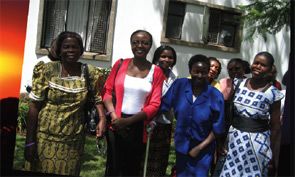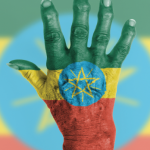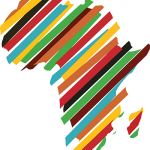When Sharon Argwings-Kodhek was told in 2007 by a physician in her native Kenya that she had a thyroid problem, her United States–based uncle, also a physician, became suspicious. Her symptoms were fatigue, pain in all of her muscles, weight loss, knee problems, and a tingling sensation in her fingers that progressed to pain.
“You need to come here immediately,” her uncle said.
She left to visit her uncle in Texas three days later. Within a few short days, Argwings-Kodhek could not even get out of bed. Tests revealed that she had lupus, with her kidneys functioning at only 60%.
Argwings-Kodhek received treatment for lupus, including chemotherapy, and decided to go back to Kenya armed with as much information about the disease as possible. She was returning to a country with about 38 million people—but with only one rheumatologist practicing in the five countries that make up East Africa. “People who go to see him wait three, four, or even five hours because they don’t have a choice,” Argwings-Kodhek says.
She asked the rheumatologist if there was something that could be done to help educate more people about lupus and was told that most people who had the disease did not want to talk about it. “People thought that it was like AIDS or cancer,” she explains. She also encountered numerous misconceptions about the disease. In some of her work to expand lupus support, one woman asked Argwings-Kodhek to leave her office, for fear that she would catch lupus.
I realized that there was nothing to help educate people about lupus, Argwings-Kodhek says. This prompted her to write a magazine article about lupus and start a support group that she advertised at major hospitals. Her support group began in May 2009 with 16 members and has since grown to 72 members.
A Resource for Much-needed Support

The group gives lupus patients a chance to meet one another and find support for their often misunderstood disease. The members meet once a month at one of the larger hospitals in Nairobi. Some members travel three or four hours to attend. Argwings-Kodhek encourages members to bring a loved one with them so the group can educate even more people about lupus.
In addition to offering chats and support, Argwings-Kodhek is expanding education in the group via invited speakers. Specialists such as cardiologists, ophthalmologists, nurses, and others have addressed the group. A number of physicians who have spoken to the group charge members only 50% of their normal fee for treatment.
Members discuss medical treatment for their disease as well. Many people cannot afford the lupus drugs that are available. Sometimes there may not be any drugs available at all. For example, a number of patients were using the antimalaria drug hydroxychloroquine (Plaquenil) until the drug was no longer available in their country, Argwings-Kodhek says.
The group also discusses practical measures that members can take to improve their lupus symptoms. “Fatigue is such a big problem with lupus,” Argwings-Kodhek says. “Trying to exercise will help reduce fatigue.” In Kenya, this often means walking.
By training even a small number of workers, well-informed knowledge about diseases such as lupus can be shared with a larger group throughout the country and East Africa.
Another consideration is sun exposure. “The sun is very hot in Kenya and you can’t keep out of it 100%, but you can at least cover your body,” she says.
Members also talk of the importance of writing down questions that they have about their disease and listening to their bodies. Members of the group are overcoming misconceptions that the disease is a weakness and are becoming bolder about stating that they have lupus, Argwings-Kodhek notes.
Funds to Expand Education
The support group, which is now part of the Lupus Foundation of Kenya, is supported by the International League of Associations for Rheumatology (ILAR). “We’d been funded to develop rheumatology education in East Africa. The idea was to convocate rheumatologists and aid in education and awareness,” says Ines Colmegna, MD, assistant professor of medicine in the division of rheumatology at McGill University Health Center in Montreal, Canada. Dr. Colmegna recently visited the Kenyan support group.
To help with the education efforts, ILAR has developed an eight-week course to be offered at the University of Nairobi. The course is meant for medical students, graduate students, residents, and others to help expand their understanding of rheumatology. “We need to bridge the gap and educate community health workers,” Dr. Colmegna says. The ACR is also involved in the ongoing rheumatology training in East Africa.
Online Resources
Learn more about Sharon Argwings-Kodhek’s lupus support group and other efforts to expand rheumatology education in East Africa at www.arthritisafrica.org or via the Facebook page Lupus Foundation of Kenya.
In addition to education for health workers, Dr. Colmegna says that tailoring patient education specifically for life and culture in East Africa is necessary. For example, education about exercise should focus most heavily on walking, which many people in these countries already do.
Argwings-Kodhek and Dr. Colmegna recently attended the 2010 ACR/ARHP Annual Scientific Meeting in Atlanta together. The meeting helped Argwings-Kodhek gather a mass of information and written materials about lupus to share with group members. The two also presented poster data relating to lupus in East Africa.
“Coming to the meeting was a good opportunity for me to network, learn more, go back, and teach people,” Argwings-Kodhek says.
Rashmi B. Dixit, MD, PhD, associate clinical professor of medicine at the University of California, San Francisco, is involved with the rheumatology curriculum for the University of Nairobi. “Even in this day and age, there are communities with no rheumatology support at all,” she says. By training even a small number of workers, well-informed knowledge about diseases such as lupus can be shared with a larger group throughout the country and East Africa,” Dr. Dixit says.
Among her goals for the support group, Argwings-Kodhek would like the group to become well known throughout the world, receive more funding to help patients, and have a Lupus Day to create awareness.
Vanessa Caceres is a medical writer in Bradenton, Florida.


